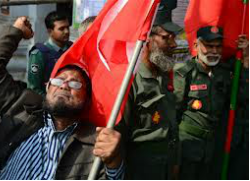
The International Crimes Tribunal in Bangladesh is an ongoing court mandated to investigate and prosecute individuals who committed atrocities during Bangladesh’s war of independence with Pakistan in 1971.
On February 5, 2013, the Tribunal sentenced Jamatt-e-Islami chief Abdul Kader Mullah to life for his alleged role in crimes committed during the 1971 independence war. Mullah was convicted on five of six counts, including murder and rape as crimes against humanity. The ruling sparked nearly two weeks of angry mass protests throughout Bangladesh resulting in parliament amending a law that will now allow the state to retroactively appeal against the life sentence and seek the death penalty.
Under the amended law, the government and others can now appeal against verdicts at the International Criminal Tribunal. The amendment also gives powers to the special tribunal to prosecute organizations or political parties who were allegedly involved in the war crimes. As eight of the accused are Jamaat party leaders, many within the party believe the change in the law is nothing but an attempt by the government to destroy it. However, the remaining two accused are members of Bangladesh Nationalist Party.
According to the BBC, the amended law puts the political rivals of the current Prime Minister on edge. As Prime Minister Sheikh Hasina made prosecuting war crimes a key goal of her government, critics have accused the government of pursuing political vendetta through the tribunal. Furthermore, as the majority of the accused are from Jamaat Party, if the party is indicted and then found guilty, the party can “be banned” from politics.
Another critique of this amended law and its effect on the tribunal is that it falls below the international standards required for a fair trial. According to Human Rights Watch, retroactive legislation violates fair trial standards because it undermines the work the Tribunal has done thus far. Although the government, including the Law Minister, stated that it had been drafted to ensure equal rights for both the government and the convicted, the law still grants extensive power, retroactively, to the prosecution to appeal decisions by the Tribunal.
The impact the amended law will have on the Bengali political climate or the effectiveness of the Tribunal is unclear. Even though government supporters believe that the amendment will positively affect the Tribunal and allow for fairer trials, many believe that the amendment will cause more hardship for the Tribunal long-term. For example, as the legitimacy hangs in the balance, Human Right Watch notes that some defense witnesses have decided not to go to court and that there is concern the judges will be afraid to hand out sentences other than the death penalty. Thus, as one commentator succinctly put, “instead of explaining to the public the separation of powers and the rule of law . . . the government has now directly intervened in the trial process.”
Victoria Kelley is a 3L and Alumni Editor on the Denver Journal of International Law and Politics

